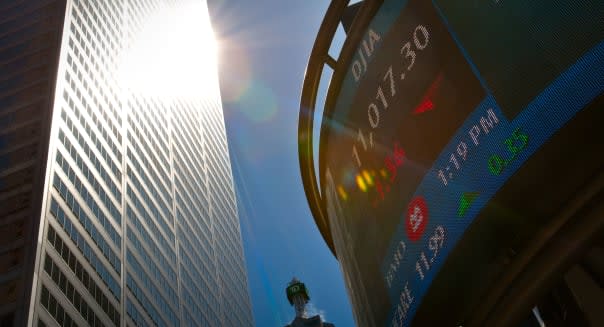The 3 Things Average Investors Need to Know About the Dow's Reshuffle

For millions of Americans, the Dow Jones Industrial Average (^DJI) is the primary way they keep track of what's happening with the stock market. The 30 stocks that make up the Dow are all well-known industry leaders with proven track records of long-term success. As a whole, the Dow seeks to include a mix of companies that are representative of the various industry groups that make up corporate America.
Many other benchmarks frequently add and remove companies from their ranks. The Dow, though, tends to be a lot more stable. That's one reason why Tuesday's announcement that three new Dow members -- Goldman Sachs (GS), Visa (V), and Nike (NKE) -- will replace three of the average's existing component companies -- Bank of America (BAC), Alcoa (AA), and Hewlett-Packard (HPQ) -- was remarkable.
It's been nine years since the Dow made such a big change in membership all at the same time.
Market experts and financial analysts have plenty of in-depth opinions about the Dow's reshuffling. But for ordinary investors, there are three things about the Dow's changes that you need to remember.
1. Don't Automatically Follow The Dow's Moves in Your Portfolio
When a group as influential as the people who make decisions about Dow components decides that new companies deserve to replace old companies, it's natural to think that the Dow is making a value judgment about the stocks involved.
Sure enough, shares of all three added stocks jumped on news of their soon-to-be Dow membership, with some investors viewing the move as an endorsement of their growth opportunities, and others just jumping on the bandwagon that Dow-tracking funds will soon have to ride.
But S&P Dow Jones Indices was careful to say that its changes "were prompted by the low stock price of the three companies slated for removal and the Index Committee's desire to diversify the sector and industry group representation of the index."
Note that low prices don't necessarily mean bad recent performance: Bank of America has risen 70 percent over the past year, and HP has climbed almost 60 percent since the beginning of 2013.
Indeed, in the past, companies that have gotten booted out of the Dow have often done quite well. Citigroup (C) was replaced in the Dow in 2009, but it has gone on to outperform rival Bank of America since then. That's consistent with research from well-known Wharton finance professor Jeremy Siegel, who found that companies taken out of the broader S&P 500 Index posted better returns than the companies that replaced them. So don't take the Dow moves as reason to sell off the stocks that were taken out of the average.
2. The Dow Will Have Much More Weight in Financial Stocks
Before the shift, the Dow seemed to have its fair share of financial stocks, with banks Bank of America and JPMorgan Chase (JPM) joining card-giant American Express (AXP) and insurance company Travelers (TRV). But because the Dow is a price-weighted index, those four companies had relatively little weight in the Dow, especially in light of Bank of America's $15 share price.
Sponsored Links
With Visa and Goldman coming into the average, the impact will be huge. That's because Visa carries a share price above $180 while Goldman trades at around $165, putting both among the top three most influential stocks in the average.
Going forward, the Dow's fortunes will be much more closely linked to that of the financial industry -- for good or ill, depending on whether the industry can continue to recover from the financial crisis and market meltdown five years ago.
3. Low-Priced Dow Stocks Are On the Hot Seat
With the Dow Index Committee specifically referring to low price as a reason for making changes, the remaining low-priced Dow stocks are on notice that they could be next. Because of the price-weighted calculation of the Dow average, low-priced stocks have relatively little influence on the Dow in any event, making their deletion less important than when a high-priced component gets removed.
The biggest threats are to tech sector stocks, where Intel (INTC) and Cisco (CSCO) carry share prices that are roughly the same as HP's. With many investors thinking that the Dow needs to find a way to include big tech companies such as Apple (AAPL) or Google (GOOG) in its mix, Tuesday's changes could signal a shift in thinking that could lead to more extensive adjustments in the future.
Dow Futures
These changes will have a big impact on the technical aspects of the Dow. But ordinary investors should remain comfortable that the Dow will continue to act as a bellwether measure of the health of the U.S. economy, and the Dow's movements are still likely to reflect the ups and downs of the broader stock market.
Motley Fool contributor Dan Caplinger owns shares of Apple and warrants on JPMorgan and Bank of America. The Motley Fool recommends American Express, Apple, Bank of America, Cisco Systems, Goldman Sachs, Google, Intel, Nike, and Visa. The Motley Fool owns shares of Apple, Bank of America, Citigroup, Google, Intel, JPMorgan Chase, Nike, and Visa.

